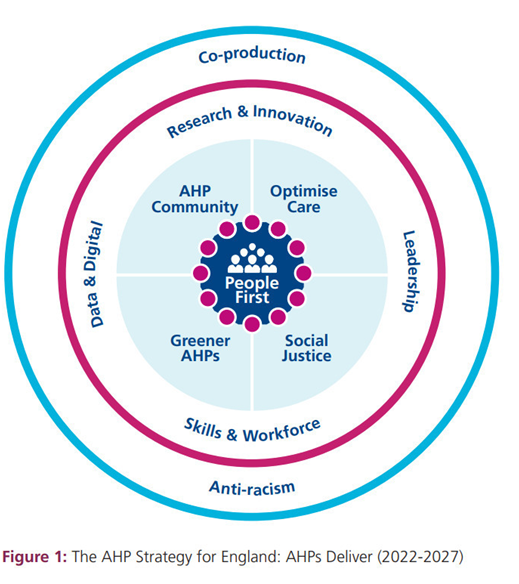This project was developed in response to the NHS England mental health programme question of “How can the Allied Health Professions workforce better support the mental health needs of patients?” Informed by the Health Education England (2021) ‘Advance, Build, Campaign, Develop and Equity, Diversity and Inclusion’ (ABCDE) of advancing AHP mental health and the AHP strategy for England 2022-2027: ‘AHP’s Deliver’ (NHSE, 2022; see figure 1), we developed a test and learn project to explore the acceptability and feasibility of recruiting, designing a referral pathway, and connecting to Recovery Navigation services to support unmet mental health needs of patients presenting to 999 emergency ambulance services.

A Recovery Navigator is a mental health professional who builds on individual interests and empowers people to play an active role in developing and maintaining their own health. As a person-centered approach, recovery navigation considers the psychological and social factors which impact on a person’s mental health. The approach supports people to navigate the mental health system and connects individuals with community services to support their overall mental health and wellbeing.
On average, 15% of 999 calls to SWASFT are mental health-related. Urgent and Emergency Care Services, such as the ambulance service, often struggle to meet the needs of High Intensity Users (HIU). Despite the work of specialist teams such as the SWASFT Complex Care Team, a gap exists when patients don’t need physical care but need additional mental health support.
Recovery navigation can address this by providing guidance and networking for mental health care in the community. It helps those whose mental health (and social care) needs are often too acute and too complex for primary care professionals to address, but who don’t meet the diagnostic thresholds for access to secondary mental health services. These individuals, who tend to fall between the healthcare gaps, frequently resort to urgent and emergency care services in an attempt to meet their health needs.
Recovery Navigators empower individuals to improve and maintain their mental health and connect them with appropriate community services. A referral pathway from 999 services to Recovery Navigation could provide ambulance staff with options for patients who could benefit from community support, especially for underserved populations who may not access other areas of the healthcare system.
In partnership with the Mental Health Integrated Access Partnership (IAP), which is comprised of SWASFT, BrisDoc, Avon and Wiltshire Mental Health Partnership NHS Trust (AWP), Avon and Somerset Constabulary, and Avon Fire and Rescue, alongside the Mental Health Charity ‘Second Step’, a Senior Recovery Navigator has been recruited and trained to support SWASFT 999 patients.
A referral pathway has been developed where 999 calls relating to mental health are triaged by SWASFT’s Mental Health Specialist Desk (MHSD) and where appropriate are then referred to the Senior Recovery Navigator. This service was launched in June 2024. This provides the MHSD team with options for patients for whom community and voluntary support services may be beneficial.
Please access relevant documentation using the links below.

Cat Scalesia
Senior Recovery Navigator
“Hello team,
I have been in this position for over four weeks now, and I am thrilled to have met many of you. I look forward to meeting even more team members soon. I’m pleased to share that we have received 8 referrals so far and hope to reach at least ten in the coming weeks. I will try my best to spend more time at EOC to promote the Recovery Navigation service and answer any questions you may have.” – July 2024
Resources
Recovery Navigator, Liam Dixon, discusses his role and the skills needed to become a Recovery Navigator. Healthier with Nature is the Green Social Prescribing Programme for Bristol, North Somerset & South Gloucestershire. It is one of seven national ‘test and learn’ sites for green social prescribing across England.
Social Prescribing Link Worker, Will Shipp discusses his role and the skills needed to become a Social Prescribing Link Worker. Healthier with Nature is the Green Social Prescribing Programme for Bristol, North Somerset & South Gloucestershire. It is one of seven national ‘test and learn’ sites for green social prescribing across England.

